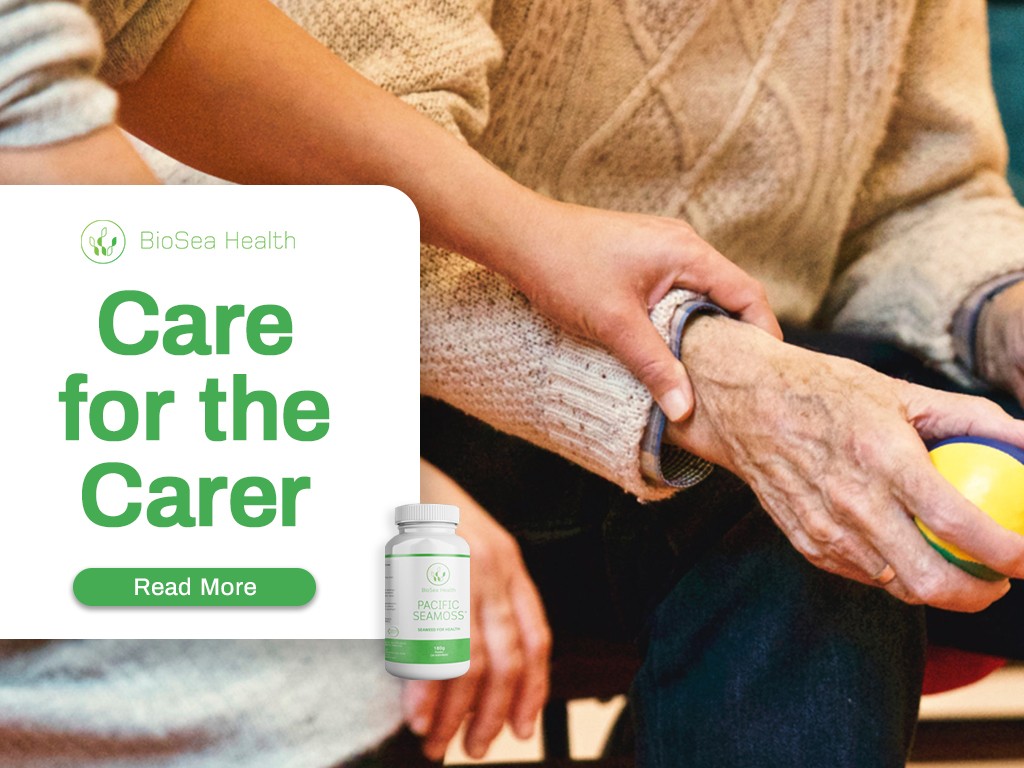I became the carer for my mother in the final months of her battle with colorectal cancer. As her disease progressed her dependence on me, day and night increased. That time of my life was the most difficult but also the most rewarding.
Compared to other full-time carers I had an easy time of it. As emotionally and physically draining as the experience was, it was over within a year and I was able to grieve my mother then return to a normal life. Others care for their loved ones for years or even decades. It is for these people that I write this paper.
From my experience as a palliative carer, and as someone who has recently started taking Pacific Seamoss, I recommend seaweed for all carers. Care for the carer.
Seaweed to Care for the Carer
1. Seaweed creates more energy for the carer
Although there is no definitive science on this, there are many possible reasons why Pacific Seamoss customers say they have more energy than they have had for years. The increase in complete nutrients plus the benefits of increased good gut bacteria probably accounts for the new levels of energy. Every carer feels fatigued at some point and extra energy without the sleep-depriving effects of caffeine are a real benefit to daily life.
2. Seaweed contains molecules that help you cope better with stress
Being a carer is stressful. Not only are you dealing with the physical demands, but there is also the mental load of the distress of your loved one, plus the emotional loss of the healthy person you once. Tyrosine is just one of the nutrients found in seaweed that converts to neurotransmitters in the brain to increase mental function and reduce fatigue during times of stress. So owe it to yourself, and take seaweed to care for the carer[1]
3. Seaweeds boost immunity to Care for the Carer
Being a carer means getting sick is not an option. You need to be healthy to carry out the daily tasks of caring for your loved one, plus you don’t want to make them unwell by passing on a cold or flu. Seaweed is high in major immune-boosting co-factors like Vitamin C, Vitamin A, Vitamin B3, and zinc.[1] Seaweed also has well-documented antioxidant properties to help fight infection and disease. [2]
4. Seaweed prevents major diseases caused by chronic stress
As much as we like to think we are coping well, being a carer is having a physiological effect on our bodies. Stress changes the hormonal balance so hormones like cortisol, glycogen and adrenaline are working against us, dramatically increasing the risk of major diseases like cancer, cardiovascular disease and type 2 diabetes. The science shows that seaweed is a good long-term option for prevention of stress-related disease.
- Cancer is reduced in populations that consume seaweed, plus seaweed shows cancer prevention properties. [3-5]
- Seaweed reduces blood pressure, cholesterol and waist circumference – all risks for heart attack. [5-7] (Check out our review)
- Seaweed reverses glucose intolerance and improves energy storage and metabolism, reducing risk of type 2 diabetes. [7-9]
Being a carer is not easy, yet it is something feel we must do. I suggest you make things easier for yourself; being kinder to you will allow you to be kinder to the one you love. Seaweed will make things easier for you. Care for the carer.
Further Reading
[1] M. L. Cornish, A. T. Critchley, and O. G. Mouritsen, “Consumption of seaweeds and the human brain,” Journal of Applied Phycology, vol. 29, no. 5, pp. 2377-2398, 2017.
[2] F. Makkar and K. Chakraborty, “Antidiabetic and anti-inflammatory potential of sulphated polygalactans from red seaweeds Kappaphycus alvarezii and Gracilaria opuntia,” International Journal of Food Properties, vol. 20, no. 6, pp. 1326-1337, 2017. (Google Scholar)
[3] J. Kim et al., “Associations among dietary seaweed intake, c-MYC rs6983267 polymorphism, and risk of colorectal cancer in a Korean population: a case–control study,” European journal of nutrition, pp. 1-12, 2019.
[4] J. Teas, Q. Zhang, and S. Muga, “Seaweed as chemoprevention: From breast cancer epidemiology to breast cancer cell culture,” ed: AACR, 2006.
[5] A. Nanri et al., “Dietary patterns and all-cause, cancer, and cardiovascular disease mortality in Japanese men and women: The Japan public health center-based prospective study,” PloS one, vol. 12, no. 4, 2017.
[6] P. Matanjun, S. Mohamed, K. Muhammad, and N. M. Mustapha, “Comparison of cardiovascular protective effects of tropical seaweeds, Kappaphycus alvarezii, Caulerpa lentillifera, and Sargassum polycystum, on high-cholesterol/high-fat diet in rats,” Journal of medicinal food, vol. 13, no. 4, pp. 792-800, 2010.
[7] S. Wanyonyi, R. Du Preez, L. Brown, N. A. Paul, and S. K. Panchal, “Kappaphycus alvarezii as a food supplement prevents diet-induced metabolic syndrome in rats,” Nutrients, vol. 9, no. 11, p. 1261, 2017.
[8] J. Teas, M. E. Baldeón, D. E. Chiriboga, J. R. Davis, A. J. Sarriés, and L. E. Braverman, “Could dietary seaweed reverse the metabolic syndrome?,” Asia Pacific journal of clinical nutrition, vol. 18, no. 2, p. 145, 2009.
[9] Y. X. Chin, Y. Mi, W. X. Cao, P. E. Lim, C. H. Xue, and Q. J. Tang, “A pilot study on anti-obesity mechanisms of Kappaphycus alvarezii: The role of native κ-carrageenan and the leftover sans-carrageenan fraction,” Nutrients, vol. 11, no. 5, p. 1133, 2019.

